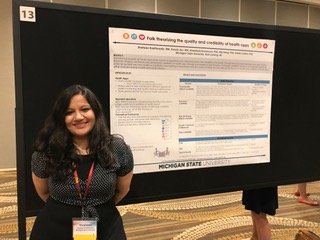Anastasia Kononova didn’t think twice about downloading a popular app that provided tips for expectant mothers and allowed them to track pregnancy progress. The free app gave her access to a giant forum and website. All she had to do was provide basic info about herself, her baby’s due date, and prospective baby name.
Before long, Kononova noticed subtle pop-up ads. While she enjoyed tracking her pregnancy day by day, she dug a little deeper and realized she had joined the service commercially supported by a major purveyor of health and baby products.
“That company probably knew my baby’s name and due date before my friends even did,” Kononova said. “I felt like my privacy and the privacy of my unborn child had been compromised somehow.”
The experience led the MSU assistant professor of advertising to assemble a team to pursue research on the use, perception and privacy implications of health-related apps. The first study, led by MSU researcher Shaheen Kantawala, involved a cross-departmental team from the College of Communication Arts and Sciences. Published in fall 2018 in Mobile Media & Communication, “Folk Theorizing the Quality and Credibility of Health Apps” examines how smartphone users make decisions when choosing from an expansive marketplace of more than 165,000 apps.
“Shaheen and the team discovered that many times, people are busy and don’t pay much attention when they’re picking an app,” Kononova said. “When we judge in fast or superficial ways, we might not pick the app that best addresses the health issues we want to manage. Another bigger issue relates to the security of personal info these apps collect, and who ultimately has access to that data without our knowledge.”
Discerning theories
Kononova said that Kanthawala was the driving force behind analyzing the results of the three-year study. A doctoral candidate in Information and Media, Kanthawala drew from her background in biological sciences, health and risk communication, and journalism to build the study’s framework and lead the project.
“We’re hoping our results will encourage people to be more discerning when determining whether an app is credible or not,” said Kanthawala. “Understanding user perception can lead to the first steps in providing safer, internet-based resources.”
App developers, too, may benefit from the ComArtSci study that used semi-structured interviews to uncover the decision-making cues and beliefs that drive consumer download decisions.
These decision-making cues included cost labels and app size, with free apps and those that gobble up less device storage more popular.
Consumers were also more inclined to download apps that appeared at the top of a search list, perceiving those apps as more credible. Consumers’ decisions heavily rely on “folk theories”—or widely accepted understandings people hold about how the world works. Folk theories, Kanthawala said, are non-authoritative beliefs that guide behavior and circulate informally based on speculation or on personal experiences. She added that the research on health apps borrowed the notion of folk theories from previous scholarly work.
“We noticed a lot of people discussed how they based their decisions on word-of-mouth from friends and families,” Kanthawala said. “Consumers also decided based on reviews or ratings they saw in the app store. That told us that people weren’t determining credibility themselves, as much as they were borrowing credibility from other people and places.”
Credibility judgments also increased based on perceptions of the app developer. Apps that were associated with recognizable health organizations were seen as more credible than those that weren’t. Consumers tended to rate apps more credible if the app was available through an app store on their device.
“Many people said they didn’t think Apple or Google would have something in their store if it they hadn’t downloaded and tested it,” Kanthawala said. “But that’s not the case. It’s interesting to see that sense of false credibility—that people think something is credible based on the platform.”
Judging credibility
Both Kanthawala and Kononova agree that health apps can be useful tools for attaining fitness goals, managing health issues, or leading a healthier lifestyle. The overarching issue is the ability of consumers to perceive and select a credible and useful app.
Kononova said the current and subsequent MSU studies focus on understanding the state of media and technological literacy among consumers, and on improving literacy in the future. Another longer-term goal is to influence policy makers to create a quality-checking agency for the growing marketplace of apps.
“If you consider the recent Facebook controversies, and the movement to inform people that their personal data are being shared with third parties, it’s becoming easier to make change for the better,” she said. “We might be seeing something similar with the health app market, and the need for more quality checks being put in place to help consumers.”
“Folk theorizing the quality and credibility of health apps” was supported by the MSU Department of Advertising and Public Relations. In addition to Kanthawala and Kononova, MSU researchers included Eunsin Joo, Ph.D., who works at Asia Culture Institute in South Korea; Wei Peng, associate professor in Media and Information, and Shelia Cotten, MSU Foundation professor in Media and Information.
